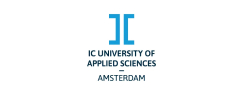Amsterdam
CapitalDutch (English widely spoken)
Language+31
Dialing Code€ Euro (EUR)
CurrencyApproximately 17 million
Population€15,000 per year*
Tuition Fees€1,000 per month*
Living ExpensesFall | Spring
IntakesWhy Study in Netherlands?
The Netherlands, known for its progressive education system, offers a vibrant and multicultural environment for students. Renowned for its high-quality education, innovative teaching methods, and emphasis on research, Dutch universities consistently rank among the top in the world. With a wide range of English-taught programmes, an inclusive society, and a high standard of living, the Netherlands provides an enriching educational experience and a gateway to global opportunities.
Benefits
Student-friendly Cities
Netherlands provide a great environment for students and cater to student needs
Affordable Cost
In comparison to other European countries, Netherlands is quite affordable
English-taught Programmes
Even though Netherlands is a Dutch country, there are various English-taught courses
Research Opportunities
Cutting-edge technology and focus on practical learning grant great research opportunities
Flexible study options
Diverse courses give students the flexibility to pick their preferred courses
Internships Availability
Real-world experience through internship programs is available for students while studying
Explore MetaApply Calculators
Eligibility Criteria
| Academic Qualifications | Equivalent to Dutch secondary education for undergraduate programmes and bachelor’s degree for postgraduate programmes. |
| Language Proficiency | Proof of English proficiency (e.g., IELTS, TOEFL) as required by the chosen programme. |
| Entrance Exams | Some programmes may require additional tests or entrance examinations. |
Required Documents
| Completed Application Form | Specific to each university or institution. |
| Academic Transcripts | Official copies from all previous institutions. |
| Proof of Language Proficiency | Test scores or certificates demonstrating proficiency in English or Dutch. |
| Statement of Purpose | Detailing your motivation and academic goals. |
| Letters of Recommendation | From academic or professional referees. |
| Passport Copy | Valid for the duration of your stay. |
| Financial Documents | Evidence of sufficient funds to cover tuition and living expenses. |
| Passport-Sized Photographs | Recent photographs as per specifications. |
VISA Requirements
| Visa Application Form | Completed and submitted to the Dutch embassy or consulate in your home country. |
| Passport | Valid for the duration of your stay. |
| Acceptance Letter | From a recognised Dutch educational institution. |
| Proof of Financial Support | Bank statements, scholarship letters, or financial sponsorship. |
| Health Insurance | Proof of health coverage for the duration of your stay. |
| Student Visa or Residence Permit | Issued by the Dutch authorities upon approval of the visa application. |
Cost of Study in Netherlands
| Tuition Fees | Varies by programme and institution; generally EUR 2,000 to EUR 15,000 per year for EU/EEA students and EUR 8,000 to EUR 20,000 per year for non-EU/EEA students. |
| Living Expenses | Approximately EUR 800 to EUR 1,200 per month, depending on location and lifestyle. |
| Health Insurance | Around EUR 80 to EUR 120 per month. |
| Books and Supplies | Around EUR 500 to EUR 1,000 per year. |
Please note: All information is sourced from web and the data may vary—kindly refer to official or government websites for the most accurate details.
Countries in Europe
Process of MetaApply
Frequently Asked Questions
Intakes vary by institution and program, but the primary intakes are usually in September/October and February/March.
Yes, international students are allowed to work part-time up to 16 hours per week during the academic year and full-time during official vacation periods.
Yes, various scholarships and grants are available from Dutch universities, government organisations, and international foundations based on merit.
After receiving an acceptance letter from a Dutch institution, you can apply for a student visa or residence permit at the Dutch embassy or consulate in your home country.
Yes, health insurance is mandatory for all residents in the Netherlands, including students, and must cover essential medical costs for accidents and illnesses.

Download Destination Guide
Get destination-wise insights, requirements, and university options.
























